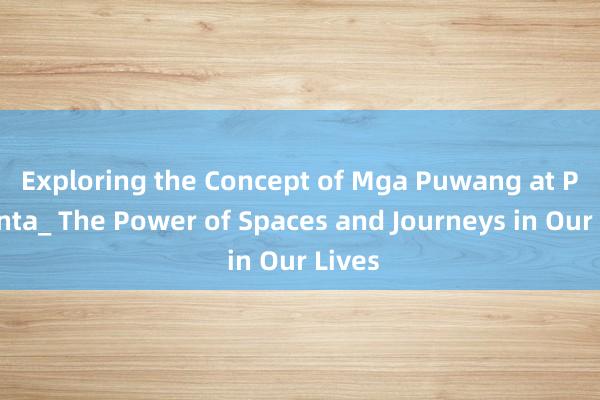Vị Trí:go88 > go88 com > Exploring the Concept of Mga Puwang at Pumunta_ The Power of Spaces and Journeys in Our Lives
Exploring the Concept of Mga Puwang at Pumunta_ The Power of Spaces and Journeys in Our Lives
Cập Nhật:2024-12-20 14:41 Lượt Xem:189

The Power of "Mga Puwang" — The Spaces We Occupy

Every journey begins with a space. This space could be physical, mental, or emotional, but regardless of its form, it acts as a starting point, a canvas upon which we chart our progress, growth, and exploration. "Mga puwang" refers to the idea of spaces, and in this context, it is not merely about the physical surroundings but also the mental and emotional areas in which we reside.
Understanding the Concept of "Mga Puwang" (Spaces)
"Mga puwang" comes from the Filipino language, where "puwang" means a gap, an opening, or simply a space. It is a word that can represent more than just a literal void; it signifies a threshold, a potential waiting to be filled, a place of contemplation, or even a site of transformation.
Physical spaces — our homes, workplaces, and cities — are obvious manifestations of "mga puwang." These are the environments in which we perform daily routines, interact with others, and experience the world. However, the power of "puwang" extends beyond the tangible; it speaks to the abstract dimensions that influence who we are and how we perceive ourselves. The spaces in our minds and hearts, the emotional spaces we create, and the internal landscapes where self-reflection and growth occur are equally important.
Think about a quiet corner of your room, a cozy nook by a window, or a peaceful park bench. These are physical spaces that provide comfort and solace. But more importantly, they allow you to retreat into a mental or emotional space — a place where you can think, process, and grow. When you step into these spaces, you are not only physically moving but are also embarking on a journey of self-discovery.
Physical Spaces: The Foundation of Movement
We begin with the most obvious type of space — the physical space. From childhood to adulthood, we occupy many physical spaces, each playing a significant role in shaping who we are. Our homes provide shelter and security, while schools and workplaces act as spaces for learning and growth. The cities we live in and the countries we visit create a broader context in which our lives unfold.
The importance of physical spaces cannot be overstated. A comfortable, organized, and aesthetically pleasing environment has been shown to reduce stress and foster creativity. For example, the serene surroundings of a park or beach allow us to decompress, recharge, and reflect. On the other hand, a chaotic or cluttered space can stifle our ability to think clearly, hindering our emotional well-being.
When we intentionally design the spaces around us, we create environments that can foster movement — both literal and metaphorical. A well-organized home or workspace can provide a sense of order, stability, and control. On the contrary, a cluttered and disorganized environment can feel overwhelming and stagnant, making it harder to move forward in life.
Mental and Emotional Spaces: The Journey Within
Moving beyond physical spaces, the concept of "mga puwang" also pertains to the mental and emotional spaces we create for ourselves. Mental spaces are the areas within our minds where thoughts, ideas, and reflections occur. Emotional spaces, on the other hand, refer to the feelings and moods we cultivate within ourselves.
Mental spaces are where we process experiences, make decisions, and envision possibilities for our futures. The mind is constantly in motion, and the mental spaces we inhabit can either limit or expand our potential. A cluttered mind, filled with worries and distractions, can hinder our ability to think clearly and make progress. Conversely, a focused and peaceful mental space enables creativity, problem-solving, and clarity of purpose.
Emotional spaces are similarly crucial. Our emotions dictate how we respond to situations and how we interact with others. The emotional space we create within ourselves can be one of peace and acceptance or anxiety and fear. By cultivating positive emotional spaces, we become more resilient and capable of handling life's challenges.
This idea of "mental and emotional puwang" speaks to the importance of self-care and emotional well-being. Just as we care for our physical environments, we must also nurture the internal spaces within us. Whether through meditation, journaling, or simply taking time to reflect, we can actively shape the mental and emotional landscapes that guide our journey.
The Role of Transitions: Spaces of Change
One of the most powerful aspects of "mga puwang" is their role in transitions. Transitions are the spaces between where we have been and where we are going. These liminal spaces, as they are often called, are moments of potential and transformation. They allow us to move from one stage of life to another, from one identity to another, or from one state of mind to another.
đăng ký đăng nhập slot go88Consider a period of personal growth — perhaps you’ve just graduated, switched careers, or ended a relationship. These moments represent a shift in your life’s trajectory, a transition from one space to another. The space between the familiar and the unknown can be unsettling, but it is also where the magic happens. It is in these spaces that we learn the most about ourselves and our capacity for change.
"Mga puwang" is not just about the places we inhabit; it is also about how we navigate the spaces between. The spaces of transition are where we experience growth, where we face challenges that push us to evolve, and where we find new directions and purpose. As we move through these liminal spaces, we redefine who we are and how we relate to the world around us.
"Pumunta" — The Journey of Movement and Growth
Once we have explored the spaces that shape us, the next question becomes: Where do we go from here? "Pumunta," meaning "to go" or "to move forward," captures the essence of movement — both physical and metaphorical. It is the act of transitioning, progressing, and embarking on a journey that brings us to new places, perspectives, and possibilities.
The Importance of Movement: Stepping Out of Comfort Zones
Movement is the natural extension of space. While spaces provide the foundation, it is movement that allows us to explore, grow, and evolve. Without movement, spaces would remain stagnant, and we would be trapped in place. The act of "pumunta" involves stepping outside of our comfort zones, embracing the unknown, and engaging in the world around us.
This movement can be physical, like traveling to a new country, trying a new hobby, or relocating to a new city. Physical movement expands our horizons, introduces us to new people and cultures, and challenges our perceptions. Whether it’s a short trip or a long journey, the act of moving opens our minds and hearts to new experiences.
But movement is not only about external exploration. It is equally important in the internal journey. Moving forward mentally and emotionally means letting go of limiting beliefs, embracing change, and pursuing personal growth. Just as physical movement leads us to new destinations, mental and emotional movement leads to new insights and ways of being.
Moving Beyond Fear: The Courage to Explore
Fear is one of the greatest obstacles to movement. Many of us are afraid of the unknown, of what lies outside the comfortable spaces we have created for ourselves. But it is precisely by moving beyond this fear that we grow. When we allow ourselves to explore new spaces — both literal and figurative — we open ourselves to new opportunities and experiences.
Think about the last time you made a significant change in your life. Perhaps you moved to a new city, switched careers, or began a new relationship. In each case, you had to overcome the fear of leaving behind the known for the unknown. This act of movement, though daunting, is what leads to growth and transformation. As we step into new spaces and embrace new challenges, we expand our understanding of ourselves and the world.
The Intersection of "Mga Puwang" and "Pumunta": Finding Balance
The most profound journeys are those that find a balance between "mga puwang" (spaces) and "pumunta" (movement). These two concepts are interdependent — spaces provide the foundation for movement, while movement gives meaning to the spaces we inhabit. Together, they create a dynamic flow that drives personal growth and transformation.
At times, we may feel the need to stay in one space for a while, to reflect, recharge, and find clarity. Other times, we are called to move forward, to step into new spaces, and to take action. The key to navigating this dance between stillness and motion is finding harmony within ourselves. We must learn when to pause and reflect, and when to take action and move forward.
Life is a constant interplay between space and movement. Each moment we spend in a space shapes our next move, and every move we make alters the space around us. This fluid exchange is what makes life so rich with possibility. Whether we are standing still or moving forward, each step we take brings us closer to the person we are meant to become.
Conclusion: Embrace the Journey of "Mga Puwang at Pumunta"
In the end, "mga puwang at pumunta" is not just about the spaces we occupy or the places we go. It is about the journey itself — the interplay between stillness and movement, between the known and the unknown. By embracing both our internal and external spaces, and having the courage to move forward, we can create lives that are rich with meaning, growth, and transformation. So, take a moment to reflect on the spaces you inhabit and the journeys you are on — because every space and every step you take is part of a larger, ever-evolving story.
Tin Liên Quan
Các nhà lãnh đạo châu Phi kêu gọi 'ngừng bắn ngay lập tức' ở miền Đông CHDC Congo 2025-02-12
Xôn xao clip cô gái rơi khỏi ôtô khi xe đang chạy trên đường 2025-02-05
Bác Nhớ Lô - Một Chuyến Hành Trình Từ Quá Khứ Đến Hiện Tại 2025-02-04
Phát ngôn 'chưa từng đọc sách' của Trấn Thành gây chú ý 2025-01-30

